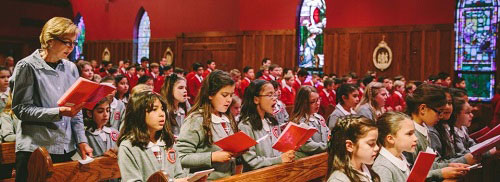

|
| Musical Musings: Liturgy |
|
|
The Pedagogy of the School Mass LiturgyThis article is reprinted from the blog, Views from the Choir Loft, and is reprinted with kind permission of Jeff Ostrowski of Corpus Christi Watershed, and the author.
Many church musicians are fortunate to have a Catholic school connected with the parish in which they work. Perhaps some of our readers are involved in preparing the music for the all-school Masses during the school year. What an immensely important and rewarding task this is. The preparation involves much more than the thoughtful selection of music. Often, it may include training student choirs and psalmists, communicating with the faculty, creating worship aid materials, and working closely with the pastor and the school music teacher. In short, preparing the school Mass is just as time intensive as planning for weekend liturgies. In our school in Dallas, we have established a great team that works together to cover all of these tasks. Those who prepare school liturgies have a tremendous pedagogical responsibility. What children will experience during their school years will have a lasting formational impact on their future as active Catholic Christians. Additionally, it's a sad fact that not all of our Catholic households are fulfilling their Sunday obligation to attend Mass, so for some Catholic children in our schools, the school Mass is the only one they ever attend. Pedagogical points to consider: 1. Choose hymn texts carefullyNo matter the style of music, the texts should be the first consideration. If you sing hymns, they must teach Catholic doctrine, not confuse it or oppose it. Hymns that speak of "us" or "I" are less strong than those that talk about things like Jesus the Good Shepherd, Christ the King, the saints, or the real presence of Christ in the Eucharist. Texts that seem to put man and God on equal footing are dangerous, and those that play in the world of pseudo Catholic spirituality are often downright heterodox. 2. Align music for the school Mass with music sung on SundayThis is an important pedagogical tool. Too often the music selected for the school Mass has nothing to do with that of the Sunday Mass. This is unfortunate. All parish liturgies benefit when planning for them happens in tandem. Children and teachers should be able to recognize the Ordinary, hymns, and psalms sung at the school Mass as ones that they would very likely sing on Sunday. Not only does this help to increase singing in the Mass, but it builds a repertoire of solid, orthodox music that becomes part of our students' Catholic DNA. 3. Make worship of God the focus of MassThe school Mass should not be a time for experimentation. Nor should it be an opportunity to use the idea of participation in the Mass as an excuse to give children a chance to 'do something.' This is dangerous because the school Mass can quickly become more of an assembly or talent show than a liturgy. Keep the focus on the corporate worship of God instead of how many children get to do something. 4. Those who do things should be held to a high standardThe desire for excellence should always be the foremost standard required for anyone who has a role in the Mass. Cantors and all musicians should be well trained and rehearsed. Good role models should be shown from the very first Mass of the school year. This year we set a fine example for our students by having our school music teacher serve as the cantor for the entire first month of school. This created an atmosphere of excellence and taught potential student cantors what would be expected of them. The same standards and expectations should be in place for students who might wish to play a prelude before Mass, and for altar servers and student readers. 5. Build an after-school choral programThe value of a trained student choir, schooled in vocal technique, exposed to excellent Catholic music in both English and Latin, familiar with both modern and square note notation, and given an understanding of the ministerial role of the schola is of the utmost importance wherever it is possible. Our student choir sings at weekly school Masses and on Sundays. When they sing on Sunday, they always sing at our high Mass and with the top adult choir, with the children often taking the soprano line of four-part choral music. Repertoire includes music of Rutter and Mawby to Allegri, Elgar, and Mozart. Our choristers are immersed in both the sights and sounds of Catholic liturgy and music, and can speak intelligently not only about key and time signatures, but about the parts of the Mass and the theology of the Eucharist. What these well-trained students bring to the school Mass experience is invaluable. I cannot over-emphasize the importance and lasting value of creating an excellent liturgical choral program. The school Mass can be an important learning experience for students each and every week. For those who help to plan and prepare for this Mass, the pedagogical potential is enormous. Let's all take this responsibility seriously. If you are met with opposition or criticism, both of which are very likely, enter into prayer, enlist the help and advice of your pastor, and continue to educate yourself about the liturgy so that you can continue this important work with courage. Article originally posted 16 February 2017
Copyright © 2017 by Corpus Christi Watershed |
Submit Your Music / Contact Us / Company Description / Links
